A Research Agenda to Protect Human Health and Build Resilience in the Face of a Changing Climate (2025)
Chapter: Front Matter
A Research Agenda to
Protect Human Health and Build Resilience
in the Face of a Changing Climate
Zulfiqar Bhutta and Victor J. Dzau, Editors

WASHINGTON, DC
NAM.EDU

NATIONAL ACADEMIES PRESS 500 Fifth Street, NW Washington, DC 20001
This publication has undergone peer review according to procedures established by the National Academy of Medicine (NAM). As an NAM Special Publication, it is the product of a carefully considered and systematic process and has the approval of the NAM Council. It is not a consensus study of the National Academies of Sciences, Engineering, and Medicine, and does not necessarily represent positions of the individual authors’ organizations.
This publication was supported by Kaiser Permanente. Any opinions, findings, or conclusions expressed in this publication do not necessarily reflect the views of any organization or agency that provided support for the project.
International Standard Book Number-13: 978-0-309-73216-1
International Standard Book Number-10: 0-309-73216-6
Digital Object Identifier: https://doi.org/10.17226/28669
Copyright 2025 by the National Academy of Sciences. National Academies of Sciences, Engineering, and Medicine and National Academies Press and the graphical logos for each are all trademarks of the National Academy of Sciences. All rights reserved.
Printed in the United States of America.
Suggested citation: National Academy of Medicine. 2025. A Research Agenda to Protect Human Health and Build Resilience in the Face of a Changing Climate. Z. Bhutta and V. J. Dzau, editors. NAM Special Publication. Washington, DC: National Academies Press. https://doi.org/10.17226/28669.
“Knowing is not enough; we must apply.
Willing is not enough; we must do.”
—GOETHE

ABOUT THE NATIONAL ACADEMY OF MEDICINE
The National Academy of Medicine is one of three Academies constituting the National Academies of Sciences, Engineering, and Medicine (the National Academies). The National Academies provide independent, objective analysis and advice to the nation and conduct other activities to solve complex problems and inform public policy decisions. The National Academies also encourage education and research, recognize outstanding contributions to knowledge, and increase public understanding in matters of science, engineering, and medicine.
The National Academy of Sciences was established in 1863 by an Act of Congress, signed by President Lincoln, as a private, nongovernmental institution to advise the nation on issues related to science and technology. Members are elected by their peers for outstanding contributions to research. Dr. Marcia McNutt is president.
The National Academy of Engineering was established in 1964 under the charter of the National Academy of Sciences to bring the practices of engineering to advising the nation. Members are elected by their peers for extraordinary contributions to engineering. Dr. John L. Anderson is president.
The National Academy of Medicine (formerly the Institute of Medicine) was established in 1970 under the charter of the National Academy of Sciences to advise the nation on issues of health, health care, and biomedical science and technology. Members are elected by their peers for distinguished contributions to medicine and health. Dr. Victor J. Dzau is president.
Learn more about the National Academy of Medicine at NAM.edu.
A RESEARCH AGENDA TO PROTECT HUMAN HEALTH AND BUILD RESILIENCE IN THE FACE OF A CHANGING CLIMATE
Contributors
ZULFIQAR BHUTTA (Editor), The Hospital for Sick Children
VICTOR J. DZAU (Editor), National Academy of Medicine
ISMAYIL AHMET, National Institute on Aging
VIC GOMEZ BETANCOURT, Cultivando
JAMES CROOKS, National Jewish Health
ELIZABETH DEVILBISS, National Institutes of Health
ANN-CHRISTINE DUHAIME, Massachusetts General Hospital Center for the Environment and Health
SHASTA GAUGHEN, Pala Environmental Network
LYNN GOLDMAN, Milken Institute School of Public Health, The George Washington University
JAGTESHWAR (UNA) GREWAL, National Institutes of Health
TRACEY HOLLOWAY, University of Wisconsin–Madison
ANNE MARIE JUKIC, National Institutes of Environmental Health Sciences
EDWARD LAKATTA, National Institute on Aging
JAY LEMERY, University of Colorado
GABRIELA D. LEMUS, Maryland Latinos Unidos
ED MAIBACH, George Mason Center for Climate Change Communication
TULSI MODI, Johns Hopkins University
CHRIS MURRAY, Institute for Health Metrics and Evaluation
JONATHAN PATZ, University of Wisconsin–Madison
CAITLIN RUBLEE, University of Colorado
RENEE SALAS, Massachusetts General Hospital and Harvard Medical School
DALE SANDLER, National Institute of Environmental Health Sciences
CHINMOY SARKAR, The University of Hong Kong
ELIZABETH SCHENK, Providence
MICHAEL SKINNER, Washington State University
GUADALUPE SOLÍS, Cultivando
RAYMOND SWEET, Hollygrove-Dixon Neighborhood Association
ARIANNE TEHERANI, University of California Center for Climate, Health and Equity, University of California, San Francisco
SAPNA THOTTATHIL, University of California Center for Climate, Health and Equity, University of California, San Francisco
SHERI D. WEISER, Department of Medicine and University of California Center for Climate, Health and Equity, University of California, San Francisco
JOSHUA WORTZEL, Brown University
Staff
Development of this publication was facilitated by contributions of the following National Academy of Medicine staff:
SHANEAH M. TAYLOR, Deputy Director of Programs
CELYNNE BALATBAT, Consultant
EMMA LOWER-MCSHERRY, Research Associate
CHRISTOPHER HANLEY, Director, NAM Climate Grand Challenge
KIMBER BOGARD, Deputy Executive Officer and Jonathan B. Perlin, MD, and Donna J. Perlin, MD, Director of NAM Programs
REVIEWERS
This Special Publication was reviewed in draft form by individuals chosen for their diverse perspectives and technical expertise. The purpose of this independent review is to provide candid and critical comments that will assist the National Academy of Medicine in making its published Special Publication as sound as possible and to ensure that the Special Publication meets the institutional standards for quality, objectivity, and evidence. The review comments and draft manuscript remain confidential to protect the integrity of the deliberative process.
We wish to thank the following individuals for their contributions:
KAI CHEN, Yale School of Public Health
BETH ANN MALOW, Vanderbilt University Medical Center
JONATHAN PATZ, University of Wisconsin–Madison
CAREN SOLOMON, Harvard Medical School
The reviewers listed above provided many constructive comments and suggestions, but they were not asked to endorse the content of the publication and did not see the final draft before it was published. Review of this publication was overseen by HOWARD FRUMKIN, University of Washington School of Public Health. Responsibility for the final content of this publication rests entirely with the editors and the National Academy of Medicine.
This page intentionally left blank.
CONTENTS
1 CLIMATE AND HEALTH RESEARCH GAPS
Domain 1: Climate Impacts on Health and Related Economic Outcomes in the United States
Domain 3: Research and Technology Infrastructure and Capacity Building
Domain 4: Policy and Public Communication, Education, and Engagement
2 KEY FINDINGS AND RESEARCH OPPORTUNITIES











